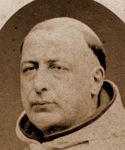Hyacinthe Loyson wrote twice to the Carmel of Lisieux. Here are those letters.
First letter
Geneva, 3, rue du Conseil General
The February 5 1911
My Reverend Mother,
Recently, I received a beautiful volume containing the life and poetry of Sister Thérèse of the Child Jesus and of the Holy Face, a nun of the Carmel of Lisieux. Notes in pen indicated that this beautiful soul had offered to God her prayers and her sufferings for what she called my "conversion", that is to say my submission to the teachings imposed by the Pope on the consciences which abdicate between his hands.
Since this dispatch was not accompanied by any letter indicating its origin, I hesitated at first to reply to it. I am addressing you today, my Reverend Mother, because I thought you knew the author.
I want to tell you that I was touched, truly touched, by many things I read in this book. I must add that I am far from being convinced, and I cannot help applying to Sister Thérèse what Saint Paul said of the pious Jews, his contemporaries and his adversaries: "They have the zeal of God, but not according to science.”
I lost, only a few months ago, the noble and pious woman whom God had given me to be the collaborator and the inspiration of all my works, during a marriage which I do not fear to call holy, and which lasted more than thirty-seven years. She undoubtedly met in heaven with the generous Carmelite who prayed and suffered so much for me, and both see, in the same light superior to the shadows of the earth, the profound truth of these words of the Holy Apostle. John: “God is love, and he who abides in love abides in God and God in him. »
I can be wrong, my Reverend Mother, I have been wrong more than once in my long life, but I am convinced that what God condemns in man is not error, when it is sincere. , it is selfishness, pride and hatred. I think I can say before death and before God that such have never been the motives of my thought and my life.
Very respectfully
Hyacinthe Loyson,
Priest,
Former superior of the Carmel of Paris.
Second letter
To the very honored Sister Geneviève of Saint Thérèse, Carmelite
At the Carmel of Lisieux
Paris, 110, rue du Bac
The 21 July 1911
My very honored sister,
I received your letter dated July 18, and I hasten to reply to it before leaving Paris. What you write to me with so much consideration, and above all with soul and heart, has touched me deeply.
I say touched, not shaken, because my convictions are as firm as they are ancient, and I would think I was seriously sinning against the truth, and consequently against God, if I did what you advise me to do. These convictions, which date back more than 40 years, distanced me from the Pope, but brought me closer to God. The noble woman who shared them was, according to those who knew her, a Saint. And Pope Leo XIII, of whom you are speaking to me, offered us, during a long stay that we made in Rome, to officially recognize our marriage if we wanted to recognize its infallibility.
You are charitable, my very honored Sister, but perhaps you are not humble enough, and you judge others without telling yourself that God may have ways on souls, on the Church and on the world that you do not know.
I'm going to spend the summer with my son's family, in Solitude-sur-Coppet, canton of Vaud in Switzerland.
You ask me to visit the Carmel of Lisieux. I would gladly do that if I weren't so far off.
At least I promise to read the book of Articles, which you just sent me. After all I know of her, your pious and heroic sister is far from being a stranger to me, and, without approving everything about her, I admire her and am grateful to her.
I thank you, my very honored Sister, as well as your companions, for the prayers that you continue to make for me, and that God, in his Wisdom, will hear and grant, in his own way. His ways are not our ways and his counsels are not our counsels.
Hyacinthe Loyson
PS I believe I can give myself this testimony that I have walked in the presence of the Eternal throughout my life, especially since my entry into the Saint-Sulpice Seminary in 1845. I have sought his Will only in Truth and Justice. I have been at fault in many acts, for I am truly a sinner, like all men, my brothers in the fall and in redemption. But, with God's help, the main lines of my life did not waver.
Glory to God in the highest, and peace on earth to men of good will!



